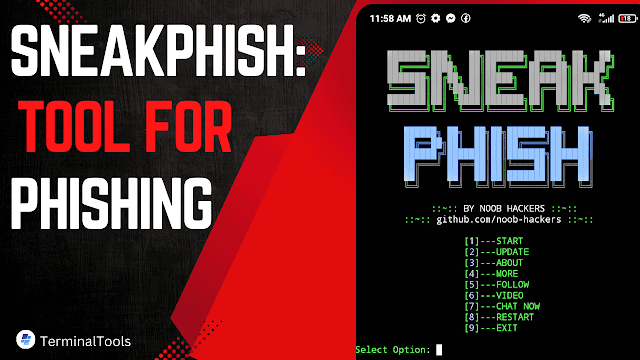Are you curious about hacking and want a tool that makes it easy to
experiment? Let me introduce you to Sneakphish—a powerful
tool built specifically for phishing social media accounts, right from your
Android device. This post will walk you through what Sneakphish is, the
features it offers, and how you can set it up on
Termux
to start your own phishing experiments.
We'll cover everything you need to know, from requirements and installation
steps to handy usage options and key features, including Google detection
bypass and WhatsApp forwarding. Ready to dive in? Let’s get started!
.png)
Tool Overview
Imagine having a tool that puts over 20 updated phishing pages right at your
fingertips! Sneakphish is designed to make
phishing
as straightforward as possible—even for beginners. It’s packed with features
like one-click port forwarding, Google detection bypass, and even a WhatsApp
forwarding option.
Availability
- Supported on: Termux
- Tested on: Termux
Requirements
To run Sneakphish, ensure you have the following:
- Internet Connection: Minimum 30 MB
- Storage: At least 100 MB
- Required Packages: PHP, wget, curl
-
Ngrok: For port forwarding
Key Features
-
20+ Phishing Pages: Stay up-to-date with the latest options
for phishing.
-
Easy for Beginners: User-friendly interface and simple
instructions.
-
Port Forwarding: Includes one-click port-forwarding with
Ngrok.
-
WhatsApp Forwarding: Direct link forwarding via WhatsApp.
-
Google Detection Bypass: Avoids Google’s phishing
detection.
-
Maintenance: Regular updates to ensure optimal performance.
Installation Guide on Termux
Here’s how you can get Sneakphish up and running on Termux:
Step 1: Update and Upgrade Packages
Start by ensuring your Termux packages are up to date. Run the following commands:
apt-get update -y
apt-get upgrade -y
Step 2: Install Required Packages
Install the necessary dependencies for Sneakphish:
pkg install curl -y
pkg install wget -y
pkg install git -y
pkg install php -y
Step 3: Clone the Sneakphish Repository
Download the Sneakphish tool from GitHub using the following command:
git clone https://github.com/noob-hackers/sneakphish
Step 4: Navigate to the Sneakphish Directory
Move to the tool’s directory by running:
cd $HOME
ls
cd sneakphish
ls
Step 5: Start Sneakphish
Run the Sneakphish tool with the following command:
bash sneakphish.sh
Additional Notes
- WhatsApp Forwarding: To enable WhatsApp forwarding, select option 4 (More) from the tool and follow the instructions provided.
- Google Detection Bypass: The Google detection code is available on the link page during setup.
This tool is simple to use, even for beginners. Follow the prompts to explore its features.
Usage Options
After installation, here are the options you’ll find in the Sneakphish menu:
-
START: Initiate an attack and explore available tool
options.
-
DUMPS: You can access saved dumps of all collected IDs.
-
ABOUT: Learn more about the tool’s author and background.
-
UPDATE: Check for and install updates for Sneakphish.
-
SUBSCRIBE: Subscribe to the official Noob Hackers channel.
- EXIT: Close the tool.
If you have any problems, watch the video here.
Conclusion
As we wrap up our exploration of Sneakphish, it's clear that
this tool offers an accessible entry point into the world of phishing for
those willing to learn. With its user-friendly interface, robust features, and
the ability to bypass common security measures, Sneakphish stands out as a
valuable resource for both novice and experienced users alike.
However, remember that with great power comes great responsibility. Phishing
is illegal and unethical, so use this knowledge wisely and only for
educational purposes. Whether you’re looking to enhance your skills or simply
understand the mechanics behind phishing attacks, Sneakphish provides the
tools you need. Stay curious, stay ethical, and happy exploring!
If you found this guide helpful, don’t keep it to yourself—share it with
friends who might also be interested in learning about tools like Sneakphish!
Knowledge grows when it’s shared, so leave a comment below with your thoughts
or questions, and let’s keep the conversation going. Happy learning, and
remember to explore responsibly!
.png)
.png)